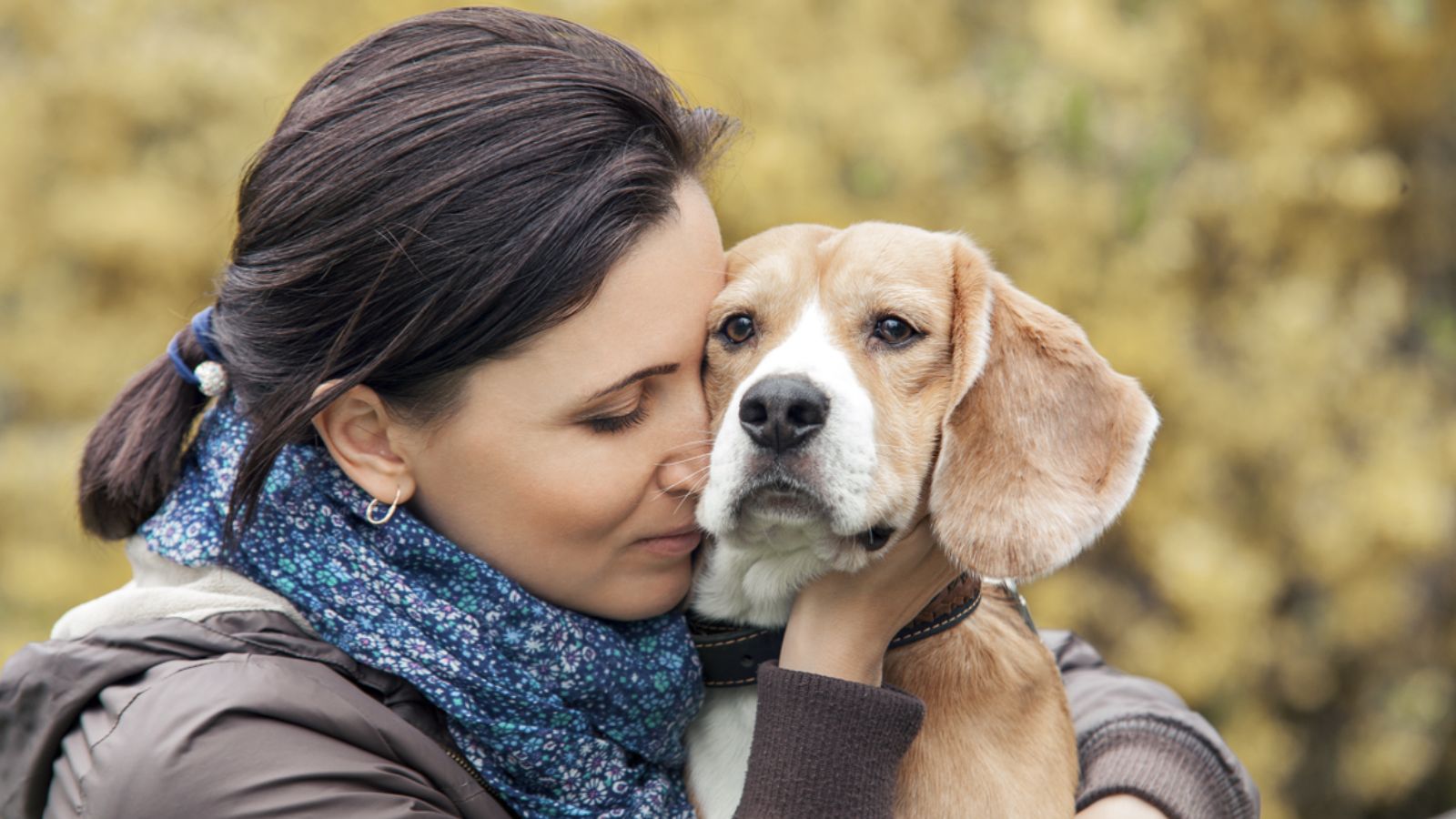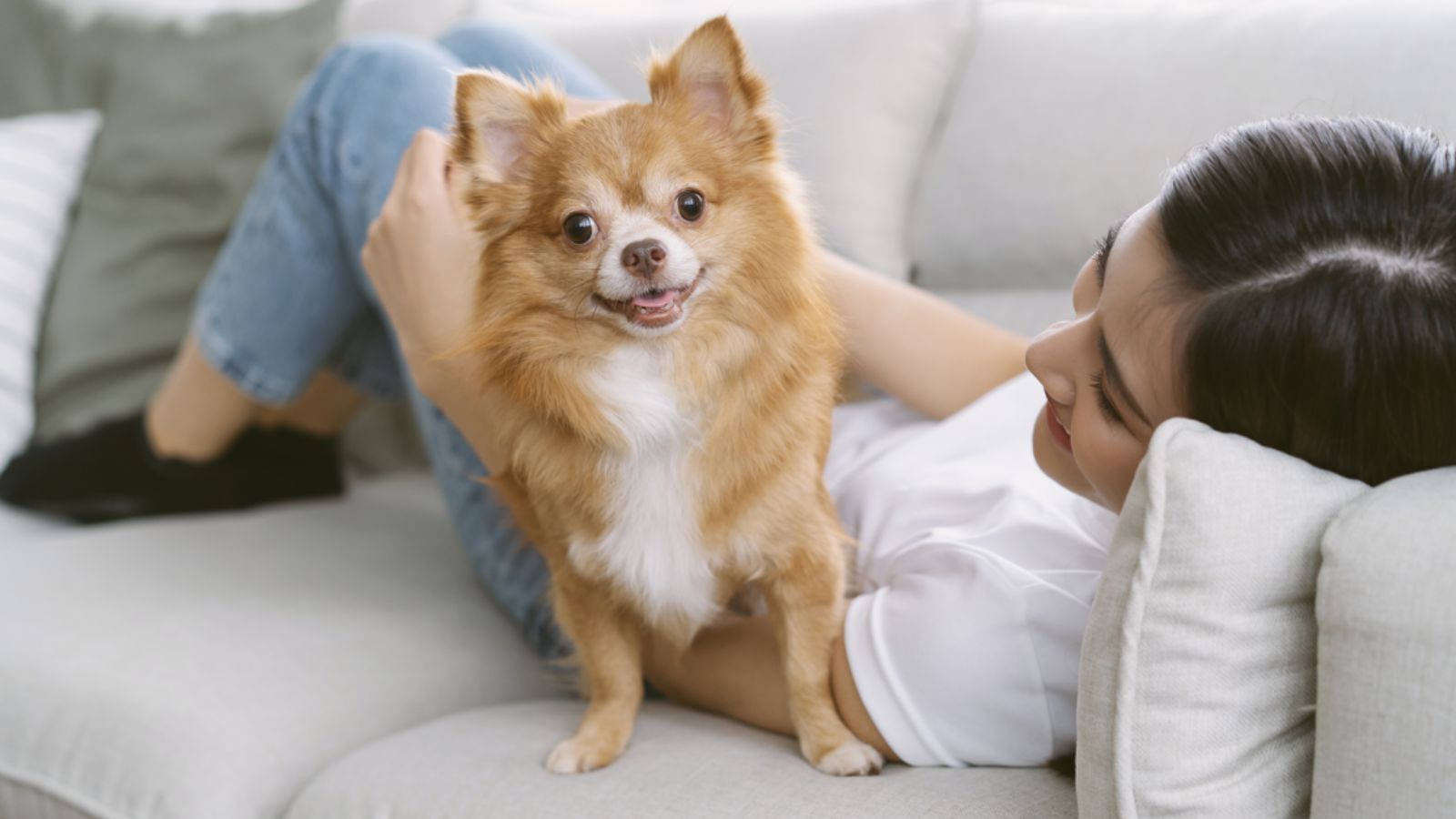While Brits love dogs, some of us find ourselves frustrated with our dogs’ habits, like constant barking, muddy paws in the house, and slobbery kisses. However, have you ever thought about what annoys our dogs about us? Here are 18 things that dogs just can’t stand about humans.
Strong Perfumes and Cleaning Products

Dogs have an incredibly powerful sense of smell. In fact, according to CareCredit, their sense of smell can be 10,000–100,000 times more powerful than our own. So while we may be enjoying the fragrance of a new perfume or aftershave, it can be very overwhelming to our doggy friends’ sensitive noses. It’s best to use subtle scents with pet-safe ingredients to keep your pooch happy and healthy.
Dressing Dogs in Uncomfortable Clothes

Some dogs don’t seem to mind being dressed up too much. However, many others find it restrictive, uncomfortable, and claustrophobic. It’s okay to try putting a little outfit or accessory on your dog, but it’s important to pay attention to how they react. If they don’t seem to like it, it’s probably best to avoid dressing them up in the future.
Loud Noises and Yelling

Dogs have a much more sensitive sense of hearing than humans, so loud noises affect them more than us. While you may not think much of slamming doors, loud voices, or other sudden noises, your dog may become easily frightened, stressed, or anxious when they occur. According to PetMD, some dogs also have a noise phobia, which can exacerbate their stress response to loud noises.
Hugging and Face Crowding

While hugs are the language of love for many humans, most dogs don’t feel quite the same way. In fact, hugs can feel somewhat claustrophobic to dogs, who usually value their personal space in the same ways humans do. Make sure you pay attention to your dog’s body language and mood before going in for a bear hug.
Inconsistent Rules and Boundaries

Most of us are aware that proper rules and discipline play an essential role in raising a well-trained dog. Unfortunately, many of us end up creating rules and boundaries that are inconsistent, which leaves our dogs feeling confused and anxious.
Being Left Alone for Long Periods

Like wolves, dogs are social creatures who thrive when they feel like they’re part of a pack. But with our busy modern lives, lots of people end up leaving their dogs alone for long periods of time. According to BlueCross, this can leave them feeling anxious and depressed and will sometimes cause long-term behavioral issues.
Lack of Exercise and Stimulation

Most dogs have a strong need for physical activity and mental stimulation. Owners who fail to give their dogs enough walks and mentally stimulating toys often leave their dogs feeling bored, unhealthy, and sometimes depressed.
Being Ignored or Neglected

Even if you don’t leave your dog alone for long periods, you can still leave them feeling ignored or neglected. If you don’t properly attend to your dog while they’re in your presence, they may feel socially isolated, depressed, or anxious.
Forced Socialization

We all know that socialization is good for dogs. But sometimes they just don’t feel like being forced into an overwhelming situation with lots of new friends. Just like for humans, situations with strangers can be stressful and scary for dogs, so it’s important to make sure you take note of their body language and don’t force them into anything that makes them feel uncomfortable.
Punishment Instead of Positive Reinforcement

Discipline is important in raising any well-trained dog. However, going too hard on the punishment and not using enough positive reinforcement can leave your dog feeling fearful and anxious.
Sudden Changes in Routine

Most dogs appreciate a sense of predictability and consistency. Therefore, changes in their routines or environments can leave them feeling stressed or anxious. It’s best to be as consistent as possible in your feeding and walking times to keep them at their happiest.
Overwhelming Dog Parks

As mentioned previously, while socialization is important, new and overwhelming situations with lots of new dogs can leave your pup feeling afraid and stressed. If your dog is timid, pay attention to their body language and be mindful of not overwhelming them too much when taking them to new locations.
Intense Staring

Some dogs like a little bit of eye contact. However, many of our canine companions see prolonged eye contact as a challenge or threat. It’s, therefore, best to avoid staring your dog in the eye for too long.
Excessive Bathing

Naturally, when your dog is filthy after an especially muddy walk, giving them a quick wash or bath can be a good idea. But bathing your pet too frequently can strip their coats of the natural oils they need to keep themselves feeling their healthiest.
Ignoring Health and Grooming Needs

Many dog breeds have long hair or complex grooming needs that must be attended to so they don’t become matted or uncomfortable. Failing to do so can leave them feeling neglected, unclean, or weighed down by excessive hair.
Erratic or Aggressive Play

Some dogs love a bit of rough play. However, playing too rough too frequently, especially with meeker dogs, can leave them feeling confused, stressed, or afraid. It’s important to pay attention to your dog’s body language and not overstep their boundaries.
Travel Without Preparation

Traveling in a car, bus, or train can be a very stressful experience for a dog. Therefore, it’s important to properly prepare for the occasion to make sure they’re as comfortable as possible. Bring familiar items such as toys or blankets, try to keep trips short, and bring essentials such as water and food.
Unclear Communication

Sometimes we unintentionally send our dogs mixed messages by switching up how we give commands or being inconsistent in our training methods. This can cause them to become confused, frustrated, or anxious over time.

